- Home
- Alison Booth
A Perfect Marriage
A Perfect Marriage Read online
Praise for Alison Booth
‘With crystal-clear prose and an artful warmth, Alison Booth leads us into the heart of contemporary human relationships, exposing tough – and necessary – truths. Very moving’
–Nigel Featherstone
‘Alison Booth captures the magnificence of female friendships and the tragedy of a disastrous marriage in a narrative that has the most satisfying of conclusions, hope’
– Nicole Alexander
Other fiction titles by Alison Booth:
Stillwater Creek
The Indigo Sky
A Distant Land
A
Perfect
Marriage
Alison Booth
Published by RedDoor
www.reddoorpublishing.com
© 2018 Alison Booth
The right of Alison Booth to be identified as author of this Work has been asserted by her in accordance with sections 77 and 78 of the Copyright, Designs and Patents Act 1988
Excerpt on page vii reproduced with permission of The Provost and Scholars of King’s College, Cambridge and The Society of Authors as the E.M. Forster Estate
Every effort has been made to trace the copyright holders and obtain their permission for the use of copyright materials. The publisher apologises for any errors or omissions and would be grateful if notified of any corrections that should be incorporated in future reprints or editions of the book
This is a work of fiction. Names, characters, businesses, places, events and incidents are either the products of the author’s imagination or used in a fictitious manner. Any resemblance to actual persons, living or dead, or actual events is purely coincidental
A CIP catalogue record for this book is available from the British Library
Cover design: Anna Morrison
www.annamorrison.com
Typesetting: Tutis Innovative E-Solutions Pte. Ltd
For my family
‘There is much good luck in the world, but it is luck.
We are none of us safe. We are children, playing or quarelling on the line’
E.M. Forster, The Longest Journey (1907)
Chapter 1
THEN
The body lay on a gurney in the middle of the room. When the coroner’s assistant uncovered the head, my heart began to knock against my ribcage and I could feel the thump-thump-thump of a migraine starting.
The assistant stood back and I stepped forward.
The body was his all right. They must have cleaned him up. I put out a hand to touch the pale forehead. It was icy cold from the refrigeration. There were fine lines around his eyes and his blond hair was tousled. He was beautiful still, in spite of what had happened to him.
I waited as the minutes passed by, almost expecting to see his chest rise and fall, almost expecting to see the eyelids flutter open. I forgot about the coroner’s assistant until she gave a discreet cough. Turning away from the body, I nodded to her. As I walked past, she took a step towards me and lightly patted my forearm.
Outside, sadness and relief wavered through my head like paper kites tossed about in a high wind. I bought a copy of the Evening Standard from the newsvendor on the corner. On the front page there was yet another picture of that woman. Behind the piles of newspapers was a wire rack with yesterday’s headlines that I knew I’d never forget.
A blast of diesel fumes from a passing bus precipitated my migraine. I leaned against the mottled trunk of a plane tree. When the nausea came, I stood at the edge of the pavement and threw up in the gutter. No one appeared to notice, certainly no one stopped.
I carried on retching until my stomach hurt. After a while, a smartly dressed woman asked if I needed help. Her kindness made me weep, hot silent tears. ‘Is there someone I can call?’ she said, her arm around my shoulders.
I hiccoughed a couple of times and accepted the tissues she was holding out. ‘I’m fine, thanks,’ I said, after wiping my eyes.
And I was. That part of my life was well and truly behind me now. I could do with a drop of water though. My mouth felt parched and I could barely swallow. But before I could get on with my life there was the coroner to deal with. She was waiting for me on the steps to the mortuary building.
All I wanted was some peace for Charlie and me. But there was no guarantee that would come easily.
Chapter 2
NOW
I see the young man’s back first, as he squeezes past the passengers cramming their luggage into the overhead lockers. His fair hair curls over the collar of his cream trench coat. He is so tall he has to stoop slightly as he presses past. Now he is looking at the seat numbers on the other side of the aisle. Although people are sitting there, perhaps he thinks they are not in their rightful places: the only unoccupied seat in this part of the plane is next to me. I pick up the book and newspaper I had placed on the empty seat.
The man turns and I realise my mistake. He is not young at all; he must be in his late thirties or maybe older. His hair is not fair either, but light brown finely streaked with white, as if he’s had highlights from some expensive Bond Street hair salon.
He mumbles a greeting. I nod, hoping this won’t be interpreted as an invitation to begin a conversation. After handing his carry-on luggage to a flight attendant to stow at the back of the plane, he sits down with a sigh. I engross myself in my book, reading the same paragraph twice without taking in any of it. Then I steal a sideways look at my companion at the same time that he is sneaking a look at me. He smiles disarmingly. I smile back but don’t put down my novel.
The plane begins to taxi along the runway and in a few moments we are airborne. Below is the shimmering snake of the River Thames, and row after row of houses, an ever-expanding vista. One of those is mine, my little terrace in Kentish Town. Soon we are swooping into a thick white bank of cloud, and upwards into a blazing blue, and London has gone.
I try to read but again I’m not taking it in. The man next to me has extracted something from his briefcase, a hardback book. Without turning my head, I glance at its cover but can’t make out the title. He turns it so I can read the dust jacket, and we both laugh. It’s the new novel by Peter Carey.
We have left England far behind and are flying over water. The sea, solid like a piece of frosted glazing, is patterned with fine ripples. A few ships are dotted in the distance, like flies squashed on the glass. The sun glints off the surface, glittering and gold-rimmed.
‘Would you like lunch, Madame?’ The flight attendant holds out a tray as if she is offering rations to a particularly ill-favoured animal in a zoo.
I decline. I ate at the airport and am not hungry. But the man next to me whispers, ‘I’ll have it if you don’t want it. I’m starving.’
At once I tell the flight attendant that I have changed my mind and she passes me the tray. My neighbour thanks me profusely and makes a start on his lunch. As he opens his water cup, he says, ‘You’re not a biologist, are you? I know there are a few on this flight.’ He has a pleasant voice; more resonant than deep, it seems to vibrate from the centre of his chest.
I nod and offer him my quiche. He transfers it onto his tray. ‘So you’re going to the same conference as me,’ he says. ‘I haven’t seen you on the conference circuit.’
‘I haven’t been to many international ones. This is only my second.’
‘I travel quite a lot. Too much really but it’s part of the job. Why so few conferences for you?’
‘I’m a single mother.’ I watch for his reaction. I’ve grown to enjoy the male retreat on learning this information. It’s a way of preserving my independence and my cynicism.
‘That must be hard.’ His tone is matter-of-fact. The piece of information I’ve given him means nothing to him.
He takes a large mouthful of quiche. He eats quickly, as do people who are used to institutional food. Probably he was educated at a boarding school, a posh one at that. For a moment I consider telling him about my daughter Charlie, but think better of it. When he has finished he puts down his knife and fork; he smiles and asks about my children.
Only one child, I tell him and soon find myself explaining how hard it is to get away to conferences, although my daughter is a dream and has never caused me any trouble, at least not yet. He seems interested, so I tell him that she’s seventeen and doing her A-levels.
‘You look too young to have a teenage daughter,’ he says. This is the usual response, the conventional response. He is being gallant, as they always are. But today I am pleased. It’s as if I gave away my scepticism with my quiche, barely five minutes ago. I explain that I had my daughter when I was twenty. I don’t want him to think I’m older than I am.
‘You look much younger than thirty-seven,’ he says.
‘I see you’re good at sums.’ I pass him the tired-looking chocolate mousse from my lunch tray. Probably I’ve been talking too much; I resolve not to say any more about Charlie.
While he polishes off his second dessert, I speculate on his family background. He will have a charming professional wife – a lawyer perhaps – and two beautiful children, whose digital pictures he might show me later in the flight, when he opens the laptop that is almost certainly concealed in his briefcase. ‘What about you?’ I ask.
‘No kids, I’m afraid, and I’m not married either.’ He doesn’t look at me but tidies the various pieces of packaging on his tray, eventually returning them to a semblance of order. He might always be methodical or perhaps my question has unsettled him. I feel embarrassed, as if I’ve been prying. It’s my fault we are on this topic; I shouldn’t have gone on at such length about my daughter. But then I remember that he asked me first. He looks at me and grins; the awkward moment passes and is replaced by a feeling almost of ease.
The flight attendant comes by with coffee. She fills my cup first but avoids my eye. She lingers over pouring my neighbour’s coffee and offers him an additional mousse; she has several spare in the galley. After he declines, we grapple in silence with the aluminium foil covers on our pots of milk. Mine comes off with a rush; the milk spatters all over my hand and drips onto the tray. My neighbour passes me his napkin and asks me my name.
‘Sally Lachlan,’ he repeats after I’ve told him. I like the way he pronounces the syllables, on different notes. ‘You’re at University College, aren’t you? I read one of your papers in the latest issue of Trends in Genetics.’
I am delighted. I saw somewhere that on average two people in the world read each academic journal article: it’s gratifying to meet one of them. ‘Was that the one on stem cells?’ I ask.
‘What, do you have more than one paper in that issue?’ He is laughing now.
‘Was it on stem cells from skin?’
‘From skin and not human embryos – isn’t that what you work on? That will have ethical implications, won’t it?’
‘You mean there won’t be any?’
‘Do you ever answer questions, Sally, as well as ask them?’
‘Sometimes,’ I say, laughing. ‘What’s your name?’
‘Anthony Blake.’
My laughter dries up. I hadn’t imagined Anthony Blake would be close to my age. He has been publishing for so long I’d assumed he’d be nearing retirement. He has been at Imperial College for a number of years, so it’s surprising that we haven’t met before, although I know he visits the United States frequently.
The flight attendant takes away our trays as we approach the Spanish coast. The plane is dropping, wheeling like a bird of prey over cracked brown hills. The landing gear descends and the plane floats down towards the runway. As the wheels touch the tarmac, I look at my companion at the same moment that he turns towards me. For the first time I see his face full frontal. He smiles and I feel a shock of recognition. I smile back. His eyes are a deep blue.
The moment is broken by the hubbub of excited voices, the click of seat belts unfastening, the opening of the overhead lockers. Someone is calling, ‘Sally! Sally!’ and I look up to see a colleague waving for me to join her. I turn to Anthony, who offers me his hand, a strange gesture.
‘It’s been really good to meet you,’ he says. I shake his hand, somewhat awkwardly in the confined space. It is cool and dry and I don’t want to let go of it. Next he collects his coat and briefcase, and is given his luggage by the simpering flight attendant. After extricating myself more slowly, I leave the plane with my colleague.
At the luggage carousel, I notice Anthony on the far side, standing with a man I haven’t seen before, probably also a conference delegate. I watch Anthony watching me. I am at the mercy of my biochemistry now. Isn’t this what attraction is? I can almost feel the neurotransmitters making connections. Watch out, body: here come the monoamines. Watch out, body: dopamine, adrenaline, and serotonin are on the loose.
Chapter 3
NOW
My hotel bedroom is huge, with heavy dark wooden furniture that is dwarfed by the expanse of red quarry-tiled floor. It is past sunset and the shutters have already been fastened. I open the French windows and unlock the shutters. There is an almost full moon hanging in a navy-blue sky. The moon illuminates a narrow lawn below, edged on the far side by a paved walk that follows the curve of the battlements defining the edge of this rocky headland. Beyond the ramparts, the Atlantic Ocean glimmers; waves are crashing against the rocks below the stone castle walls. I stand there for a few minutes, breathing deeply the fresh salty air. This harbour is the spot from which, over half a millennium ago, Christopher Columbus set sail to find North America.
Yesterday I might have found that thought sobering. Tonight I find it exciting. I fold the shutters back again but leave one window open to air the room.
The bathroom is enormous; like a mausoleum, its walls and floor are lined with white marble. I turn on the lights and survey myself in the mirror. The spotlighting illuminates the auburn hair of this pale stranger, this woman whom I have met today for the first time in a plane on the way to Vigo. Perhaps Anthony Blake is also looking at himself in a mirror in a bathroom that is the pair of mine, somewhere in this lavish hotel, and thinking of me. In this light my eyes look a darker brown than usual, and the freckles on my nose stand out harshly against my white skin. I dab my nose with powder and brush some highlighter onto my cheekbones. I cannot find a comb, so run fingers through my springy hair until it stands up around my face like the padded coiffure of an Edwardian lady. I smile at my reflection and try to imagine what a stranger would see. A quite pretty woman, a quite ordinary woman, I can’t decide which. But how silly I’m being and now it’s almost nine o’clock. I collect my jacket.
In the queue leading into the dining room I join some colleagues. We are at the end of the line, and cannot choose where to sit; there are only a few seats left at a table on the far side of the room next to the windows.
After a few minutes I see Anthony moving towards us. ‘May I join you?’ he asks. He is not expressing any preference. There is no alternative: these are the only vacant seats.
‘Of course,’ several of us say in unison.
Anthony sits down opposite me. Again I experience a feeling of recognition. He reminds me of someone but I can’t think who. Perhaps if I talk to him I shall remember.
‘Sally,’ a Swedish man says, ‘you never told me what happened to the organoids your lab grew from human skin cells.’
I tell him about our organoids, those tiny organ buds that could be so useful to regenerative medicine. While I talk, I am crumbling bread in my fingers and looking at Anthony; at the line of his jaw, at the way his hair sits against his collar.
‘They did that at Stockholm too,’ the man says.
Now I am watching Anthony’s hands as he twists his water glass; they are strong with long, slightly blunt-ended finger
s. When he smiles at me, my skin starts to feel different. Like that moment on a hot summer’s night when you step into warm water and there is no difference in temperature between your body and its surrounds, and the water glides over your skin like silk. Blind-sided for an instant by longing, or perhaps it is nostalgia for past summer holidays and the safety of childhood, I lose concentration and am brought into the present only when the Swedish man asks me a question.
Once dinner is over, people at our table drift off, some to the bar, some to their rooms to prepare their talks or to read the papers that have been distributed. Anthony and I are left behind, facing each other across the table.
He smiles. His face creases up but it creases in the right spots. He has a kind face. A serendipitous quirk of nature perhaps, for who knows what he is really like. While we talk more about the organoids and the problems of their short life, my biochemistry shifts into overdrive and myriad neurotransmitters signal a story that is far more distracting than the organoids. Anthony’s gaze never leaves mine; it is impossible to look away. I am being pulled towards him, I feel as if I could dive into the pools of his dark blue eyes.
We are interrupted by a small entourage led by a man in a suit, and it’s clear that it’s not me they wish to talk to. Although Anthony introduces me, I make my excuses. I don’t want to appear to be hanging around him, like a groupie around a rock star, and anyway I am nervous about my talk tomorrow. I need to read through my paper at least one more time. Only Anthony notices that I am going. ‘Goodnight, Sally,’ he says.
No wonder he is universally liked.
* * *
Someone has been in my room while we’ve been at dinner. The window has been closed again and the cover removed from the vast bed. This intervention, the custom at many hotels, comes as a shock. I feel irrationally annoyed, as if my house has been broken into. On one side of the bed – not the side that I would have chosen – the sheet has been folded over to form a triangle, inviting me to sleep. I fold back the other corner of the sheet and open the window before picking up the phone and calling my home number.

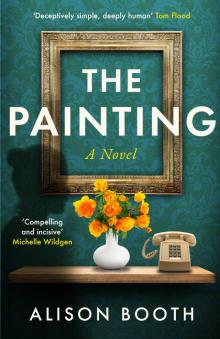 The Painting
The Painting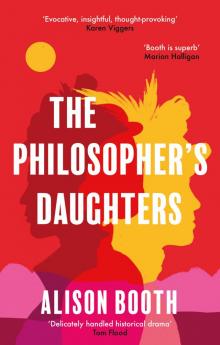 The Philosopher's Daughters
The Philosopher's Daughters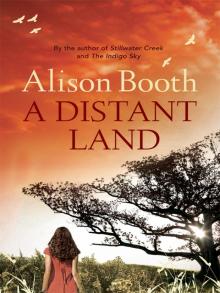 A Distant Land
A Distant Land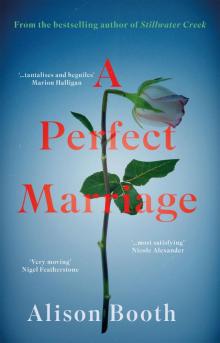 A Perfect Marriage
A Perfect Marriage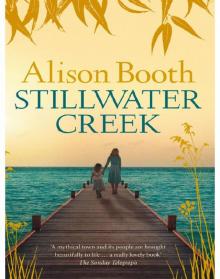 Stillwater Creek
Stillwater Creek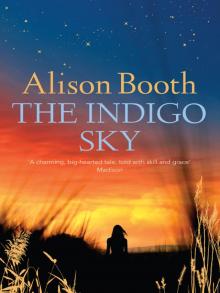 The Indigo Sky
The Indigo Sky